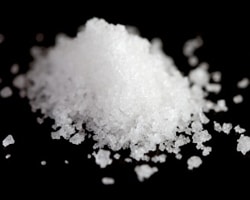
Background on Salt
The Bible contains nearly 50 references to salt, for example: the requirement of adding salt to a grain offering (Leviticus 2:13). Historically, salt was highly valued and esteemed by society, so it was used as barter. Animals, no matter how much mineral content they may derive from the vegetable matter they graze on, instinctively seek out natural salt licks to complete their diet . . . or they die. So bottom line… is salt good or bad for us? Table salt and most sea salts are bad for us and, as we will discover, are synthetic, not natural at all!
Synthetic Processed Salts
Synthetic salt, commonly referred to as table salt, and most sea salts have little or no nutritional value. Refined salt is pure, and is dead energy! Natural, healthy salt is living; it should be whole and adulterated. Common table salt, and many sea salts, goes through an 8 step refining process:
Salt Refining Process
- Brine (salt water) enters a series of heaters which elevate the temperature to 290 degrees under high pressure.
- Heated, supercharged brine goes into a "graveler" filled with cobblestones to remove impurities.
- Pressure is lowered via a series of "flashers," cooling the brine to 226 degrees, allowing crystallization to begin.
- Salt crystals form in a large evaporator pan and the wet salt is automatically raked into a large well.
- The wet salt then goes into a centrifugal separator removing the remaining water.
- Then the salt goes into a rotary dryer, making the salt perfectly dry.
- Magnetic screens are then used to separate the salt into different sizes.
- Each size of salt crystal is stored in separate bins.
High Heat Processing Kills Energy and Leaves us with Dead Salt!
- Note this process removes 82 of the 84 minerals found in sea water. Refined salt, now called sodium chloride, also has harmful additives to prevent moisture absorption and caking. This adulterates the salt.
- To make matters worse, alumino-silicate of sodium or yellow prussiate of soda is added to complete this "junk food". Aluminum compounds are highly toxic, and have been associated with Alzheimer's Disease and other health conditions!
The Final Step Makes Common Table Salt Tie for #1 Worst Food!
- Corn sugar (dextrose) is typically added to salt to keep it free-flowing. Yes, salt has 20% refined sugar added, making refined salt absolutely the worst food for us!
Motivation for Salt Refining
It's not too hard to realize the processing of salt renders it a "junk food." To understand the motivation, however, one only needs to follow the money. The primary use of salt is not as a food additive, but for industrial purposes. Only 7% of salt manufactured goes for food; the other 93% goes to industry. Industry requires chemically pure sodium chloride for manufacture of explosives, chlorine gas, soda, fertilizers and plastics. Since refined table salt is formulated specifically for industrial and chemical usage, little concern is given to its toxic effect on human biology.
Of course the trace minerals originally in salt are quite valuable. Manufacturers can make a lot of extra money by selling the other 82 elements extracted from sea water, leaving only the sodium and chloride for refined salt. The resulting refined table salt still tastes salty, though, like white sugar or white flour, it is missing most of its original nutrients.
Find out about healthy salt in Part 2.
Please Live Healthy, Forever!




